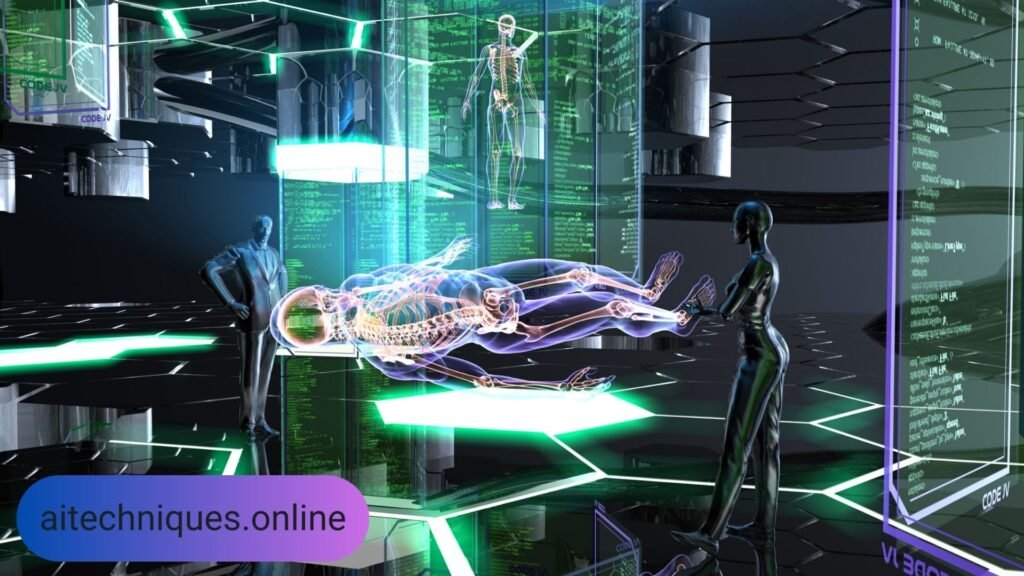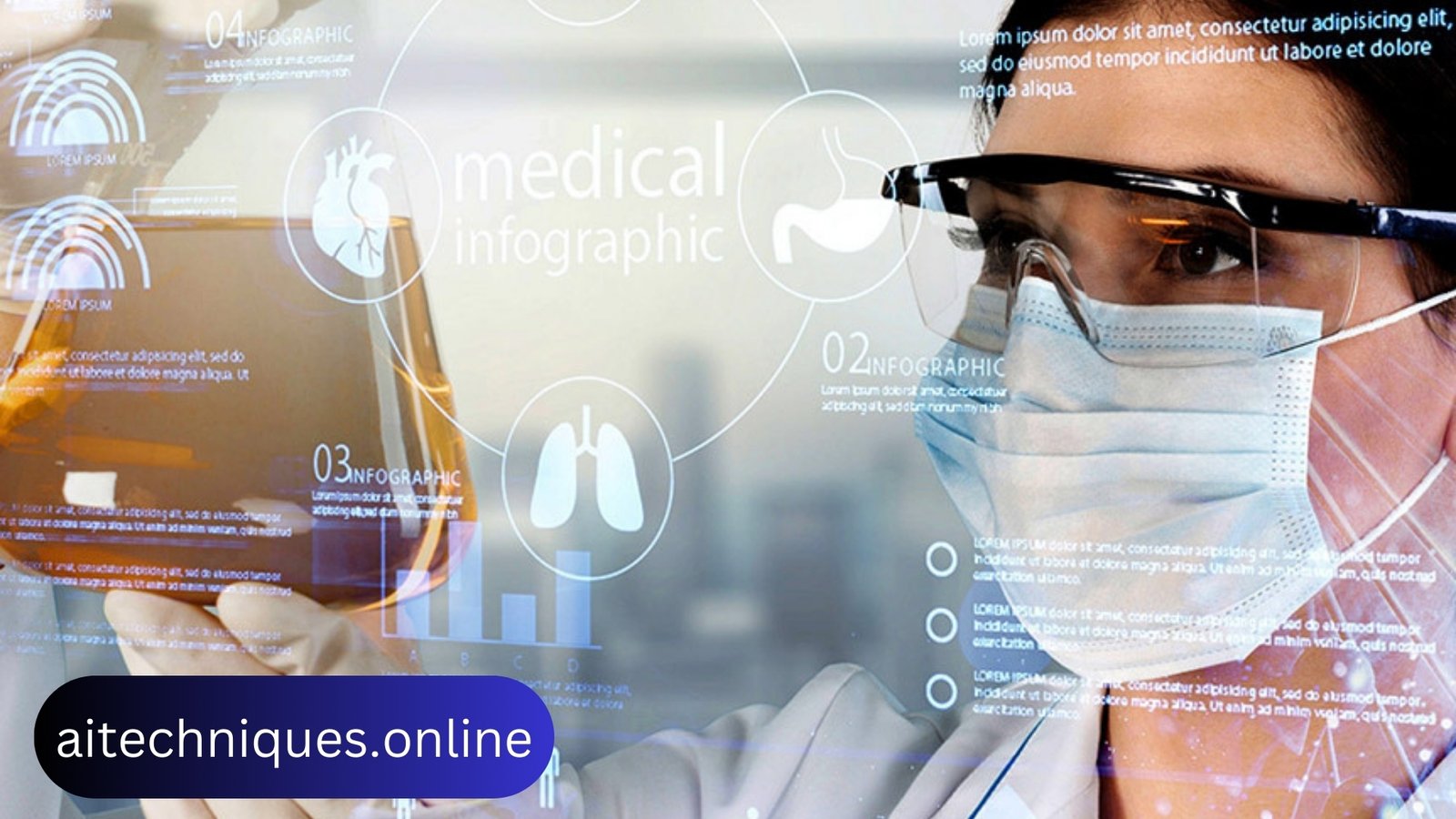Artificial Intelligence (AI) is more than just a buzzword. It’s changing industries worldwide, and healthcare is no different. From diagnosis to individualized treatments, AI has become a significant ally for improving patient results, streamlining the process, and cutting costs. In this post, we’ll look at how AI has revolutionized healthcare, providing valuable information and concrete scenarios to help us understand the profound impact on the healthcare industry.
The Promise of AI in Health Care
AI is used in healthcare to improve decision-making processes, increase efficiency, and increase healthcare for patients. Using machine learning algorithms and extensive data analysis, AI can analyze vast medical information to detect patterns and create precise forecasts. AI can revolutionize health care delivery, starting from the early detection stage and continuing through treatment and follow-up care.
Early Disease Detection and Diagnosis
Several intriguing applications for AI in health care include the early detection of disease and treatment. Traditional diagnostic methods can be laborious and susceptible to human errors. However, AI algorithms can analyze medical pictures, laboratory results, and patient files to detect small patterns that could suggest the presence of a condition. In particular, AI-powered image recognition software can spot warning signs of cancer in mammograms more accurately than human radiologists.

Personalized Treatment Plans
AI can sort and analyze vast quantities of patient data, allowing the creation of individualized treatment strategies. By considering the individual’s characteristics, such as lifestyle, genetics, and medical history, AI can suggest individualized treatments that are more likely to succeed. This strategy improves patient outcomes and lowers the likelihood of adverse drug reactions.
Enhancing Medical Imaging
Medical imaging plays an integral part in diagnosing and monitoring different ailments. AI algorithms can analyze medical images, including X-rays, MRIs, and CT scans, to spot irregularities and help radiologists diagnose accurately. In particular, AI-powered devices can detect the early signs of diabetic retinopathy on retinal images. This allows prompt intervention and prevents the loss of vision.
Predictive Analytics for Disease Prevention
AI can use predictive analytics to detect those at risk of developing illnesses and act before signs develop. When analyzing health care records in electronic format, lifestyle information, and genetic data, AI algorithms can identify patterns and determine the probability of developing diseases such as heart disease, diabetes, and mental health care issues. This proactive approach allows healthcare practitioners to adopt preventive measures and increase general health.
Virtual Health Assistants
Virtual health assistants driven by AI have revolutionized how patients interact with their healthcare professionals. The chatbots are intelligent and can offer additional all-hours support, respond to questions about medical conditions, and provide specific advice. Virtual health assistants can also remind patients to take their medication, schedule appointments, and track their health issues. In reducing the workload of health professionals and enhancing patient involvement, AI-powered assistants have improved access to health care and empowered patients to be in charge of their well-being.
Streamlining Administrative Tasks
Administration tasks within healthcare, like billing, coding, and appointment scheduling, are tedious and vulnerable to mistakes. Automating these tasks with AI can speed up processes, allowing health professionals to concentrate on patient care. For example, algorithms for natural language processing can extract pertinent information from medical records. They can also make coding more accessible, reducing the chance of mistakes and guaranteeing accuracy in payment.
Improved Patient Outcomes by Predictive Analytics
Predictive analytics based on AI could benefit healthcare professionals by recognizing those at risk and creating targeted strategies to improve outcomes. By analyzing patient information, including health care history, demographics, lifestyle, and health factors, AI algorithms can predict the possibility of problems and recommend preventive actions. In particular, AI can identify patients at risk of re-hospitalization following surgery and recommend personalized treatment strategies to minimize the risk of complications.

Enhancing Drug Discovery and Development
The conventional procedure of drug development and discovery can be time-consuming and expensive. AI has revolutionized this method by speeding the process of identifying potential drug contestants and making clinical trials more efficient. Machine learning algorithms can analyze massive amounts of biomedical research data, identify targets for molecular analysis, and determine the effectiveness as well as safety of the new drug. This method could drastically reduce the duration and costs of bringing innovative treatments on the market.
Improving Radiology and Pathology
Pathology and radiology are two areas in which AI has made significant progress. AI algorithms can extensively analyze medical images and slides, aiding pathologists and radiologists in identifying irregularities and making precise diagnoses. In particular, AI-powered systems detect lung nodules on chest CT scans and distinguish between benign and malignant lesions. By enhancing the capabilities of medical specialists, AI is improving the effectiveness and accuracy of pathology and radiology workflows.
Enhancing Patient Monitoring and Remote Care
Wearables and devices powered by AI enable continuous patient monitoring and remote medical care, especially for patients suffering from chronic diseases. These devices can collect real-time details on vital signs of activity, levels, and medication compliance, providing medical professionals with crucial insight into a patient’s condition. AI algorithms will analyze the data to alert healthcare specialists of any unusualities or risks that could be present, allowing prompt intervention and decreasing the necessity for hospitalizations. It is very important in health care field.
Addressing Health Disparities
Health Care disparities, like unequal access to health care services and varying outcomes in health care for diverse populations, pose the biggest challenges facing the healthcare field. AI could reduce these gaps by delivering customized care and facilitating accessibility to high-quality healthcare. In particular, AI-powered telemedicine systems can bring patients from remote locations with health professionals, breaking down geographic barriers while ensuring prompt access to healthcare. Furthermore, AI algorithms can analyze the social factors that affect health and determine strategies to decrease health disparities and boost the health care of all.

Ethical Considerations and Challenges
The potential advantages of AI in healthcare are huge, but concerns and issues must be addressed. The privacy and security of patient data, algorithmic bias, and the necessity of transparent and logical AI models are a few of the most pressing issues. Healthcare institutions must create robust frameworks and guidelines to ensure AI’s ethical and accountable application within healthcare. Collaboration among medical professionals, policymakers, and technology experts is crucial for addressing these problems and reap the maximum benefits from AI in healthcare.
Conclusion
AI transforms healthcare in ways that are inconceivable at one time. From early detection of disease and personalized treatment programs to increasing medical imaging and improving the outcomes of patients, AI has revolutionized all aspects of the healthcare system. By harnessing the power of AI, healthcare institutions can increase effectiveness, lower costs, and focus on providing more effective patient care. It is crucial to consider ethical concerns and challenges to ensure a fair and responsible utilization of AI for healthcare. A new healthcare system is on the way, and AI is at the heart of this new era.
If you want to learn more about how AI could change how you work in healthcare, Contact our experts now. We can all harness AI’s potential to improve patient healthcare and drive future innovations.
To read more article Visit HERE


